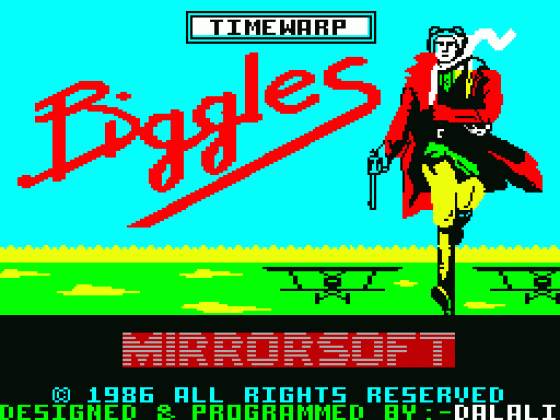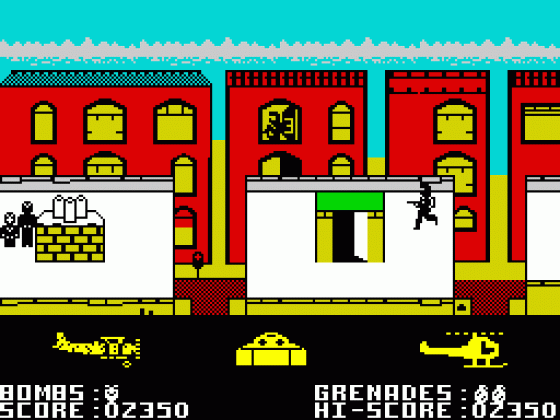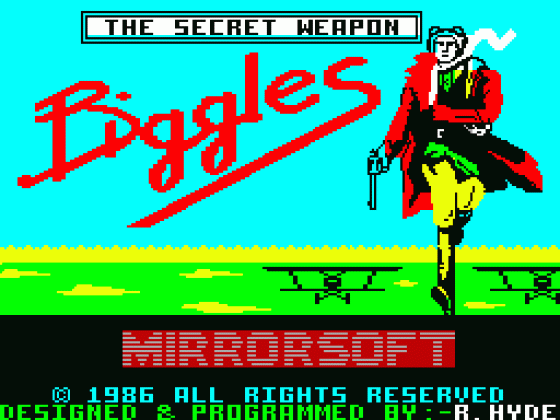
Computer Gamer
 1st July 1986
1st July 1986
Categories: Review: Software
Author: Eric Doyle
Publisher: Mirrorsoft
Machine: Spectrum 48K
Published in Computer Gamer #16
Biggles is back! Eric Doyle dons his goggles and stiff upper lip to take the "game of the film" for a test spin.
Biggles
The film version of Biggles will probably cause his creator, Capt. W. E. Johns, to turn in his cockpit. His hero had both feet firmly planted in the clouds of World War I and never in the present day. For the wrinklies amongst us, no introduction is necessary. The name of Biggles is written in the history of children's literature of the unliberated past as brightly as Boy's Own comics, Dan Dare and Enid Blyton.
In the Eighties, the Biggles collection of stories would probably raise a few eyebrows with his racist remarks and sexist commends, but the stiff upper lipped, granite jawed flying ace of the past has been transformed. Now he is a symbol of the old Empire, a hero in the old tradition taking on the evils and injustices of the world with pig-headed determination.
The rebirth of the legend has prompted Mirrorsoft to join in the celebrations with the release of a game which faithfully follows the storyline of the film and in many ways tells the tale in a more credible way. For the first time, a game of the film outdoes its precursor.
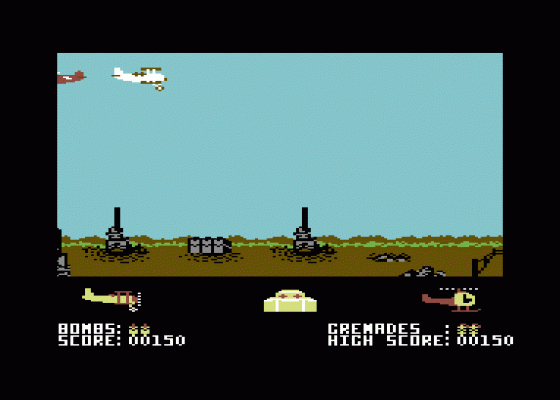
While fighting the flying Huns over the trenches of the Somme, Biggles is timewarped into the future world of super weapons which forms our present. Swapping his Sopwith Camel for a helicopter he meets his time-twin Jim and the great adventure begins. Worm holes in time have a strange effect on our hero, when the going gets tough he is zapped into another time and another place.
The game is contained on both sides of the cassette and it is best to play the first side before seriously attempting the second part.
Chocks away, part one. This is a triple-layered game with three scenarios which Biggles must complete in the correct order if he is to get the password for part two. This aim is hindered by the fact that our hero cannot hide. An instant before the bullet hits, he is transported into one of the other zones. This intertemporal behaviour can also occur as randomly as a flash of lightning. Just when our hero is getting the best of the enemy, the thunder clouds gather and there he is in a new environment.

The three scenes in Timewarp involve a different kind of gameplay. Biggles in the Air shows him in his biplane flying over the gun batteries of the Kaiser's army dodging the flak. The second scene is another part of the battlefield of 1917 with Biggles taking on the whole German army on the ground. The rooftops of present day London forms the third section and introduces his time-twin Jim.
Piloting the old Sopwith over enemy-occupied territory requires a nifty bit of joystick handling. The German gunners are pin-point accurate and each enemy pilot flies with the skill of the Red Baron himself. Planes zoon in from out of the blue and Biggles must be adept at using his speed and agility in the air if he's not to fall foul of the enemy's machine gun. Fortunately, his gun is one of those miraculous weapons with unlimited supplies of bullets and mastery of the airborne foe is easy to achieve. The main problem is avoiding the flying shells from down below.
The anti-aircraft cannon can be bombed but there is a limit to the number which a tiny Sopwith can carry. To gain more bombs, the last of the current load must be reserved for dropping on one of the enemy ammunition dumps.
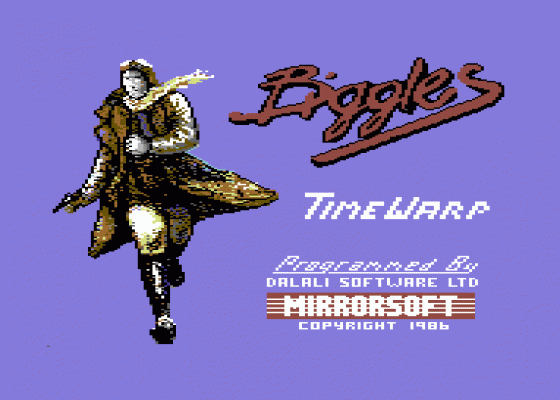
Suddenly, the screen goes black, a flash of lightning appears and there you are in the trenches or in London. The trench warfare is reminiscent of Commando, Rambo, Who Dares Wins II, etc. In all of the scenarios Biggles is travelling from left to right but on the battlefield the way is blocked by rampaging soldiers and walls of lead from the gunners hidden in concrete pillboxes.
There are two levels depicted on the screen. The upper level is normal ground level below which are caves (shouldn't there be trenches?). The only way to pass a pillbox is to hit it with a hand grenade. A supply of grenades can be found in the caves which are reached by ladders. Soldiers are everywhere, running about shooting wildly and with bayonets fixed. While Biggles is downstairs collecting grenades and wiping out any pockets of resistance down there, the enemy soldiers parade above guarding his nearest exit.
It is possible to scroll the screen so far that heis left with only one ladder to freedom. This will be under such a heavy guard that survival is nearly impossible. Easier to avoid this trap than to try to rectify it.
In London, the problem is to get Biggles and Jim safely across the rooftops. Each character is moved in turn and both must remain on screen at all times, some of the rooftops are empty but most are patrolled by a guard, beaded by a sniper or even protected by both. The buildings are all separated by a short or a long jump which can only be cleared if a suitable run up is made. Too short and Biggles is saved from plummeting to his death by a flash to another scene.
Before switching control from one character to the other, you must be sure that the other is in a safe position. This is tricky and can often lead to a nifty bit of switching back and forth before any progress can be made. Often it is easier to keep the jumping character to the front of the 3D scene but be careful, not all of the rooftops stretch to the front of the screen.
Each time Biggles timewarps one of three icons at the bottom of the screen crumbles away depending on which screen he has left. If an icon disappears, Biggles has failed in his mission and the game starts again.
Entry to The Sound Weapon on side two does not depend on knowing the correct codeword, but it helps. The game is a simplified flight simulation with Biggles at the controls of a helicopter. As he says in the film, "If you can fly a Sopwith Camel, you can fly anything."
Control of the chopper is via the joystick and the keyboard with the eventual aim being the destruction of the dreaded South Weapon. First of all there are a few tasks to be performed.
The helicopter has to report to the Allied Camp to collect Marie, a double agent. The Camp is located by using the dual mode Radar Map. In long range mode, this shows the whole area in sector blocks which light up in a colour relating to the kind of enemy to be found there, if any. The other mode shows the current sector in greater detail so that enemy strongholds and fuel dumps can be located.
The Camp is shown as a white sector on the long range map and your first lesson in navigation begins. If you succeed in reaching your target before your fuel runs out you can fly around until you see Marie. Landing while keeping her in view allows Biggles to bring her on board to join himself and Jim on a trip to the convent.
Before leaving this area of the map, you must also locate and collect Biggles' other friends Bertie, Ginger, Algie and Smith. Care must be taken not to attempt to pick up an enemy but some are spies with vital information which will help you in your mission.
Fuel is a limited commodity and fuel dumps must be raided to keep Biggles in the air. Other objects will be found on the way; the most useful of which is a machine gun.
To clear up pockets of strong resistance, you may have to leave one or two of your friends on the ground. Skill and judgement is required here because each has a different skill and you may soon wish you had your engineer aboard shortly after you dropped him off.
After dropping Marie off at the convent, Biggles can lift off again in search of the enemy weapon's test site. On the way he will be buffeted by flak and attacked by enemy planes. Ammunition will run short and fuel will be low. The game turns into a desperate search for the artefacts of survival, as well as the enemy location.
The maps are vital to reaching Biggles' goal. The short range map shows the location of most (but not all) of the items to be collected, and he would not be foolhardy enough to fly into the heart of the enemy held territory unprepared. Methodical searches are interrupted by the need to find provisions and the sectors must be crossed and recrossed many times before the mission is completed.
Another relief is to hear some music which was not written by Ron Hubbard. The themes for the scenes are the product of Tony Crowther's labours and very rich they sound. This is a great relief because there is no facility for turning the music off and sound plays an important part in The Sound Machine game.
The graphics are by far the best in this section, very reminiscent of Skyfox. Trees and enemy encampments scroll towards you as you cover more ground and aerial sends of speed is transmitted. Warning horns sound if you turn too sharply and your helicopter slips earthward during such a manoeuvre. An array of indicators must constantly be scanned, especially your damage indicator.
If your damage does not reach 100% and you reach the enemy's test site, the end of the mission is at hand and Biggles can soon rest at last.
Biggles is an all-action game which kept me on my toes all of the time. The range of challenges left me with the impression that I'd been tested to the full range of my arcade playing skills. Speed, agility, cunning and logical thought are the true armoury which Biggles demands. Never in the field of human conflict has...
Thank you Mirrorsoft for restoring my faith in games based on potential box office successes.
Other Reviews Of Biggles For The Spectrum 48K
Biggles (Mirrorsoft)
A review by (Crash)
Biggles (Mirrorsoft)
A review by Rachael Smith (Your Sinclair)
Biggles (Mirrorsoft)
Biggles comes unstuck in time in the latest barnstormer from Mirrorsoft
Biggles (Mirrorsoft)
A review by Clare Edgeley (Sinclair User)






